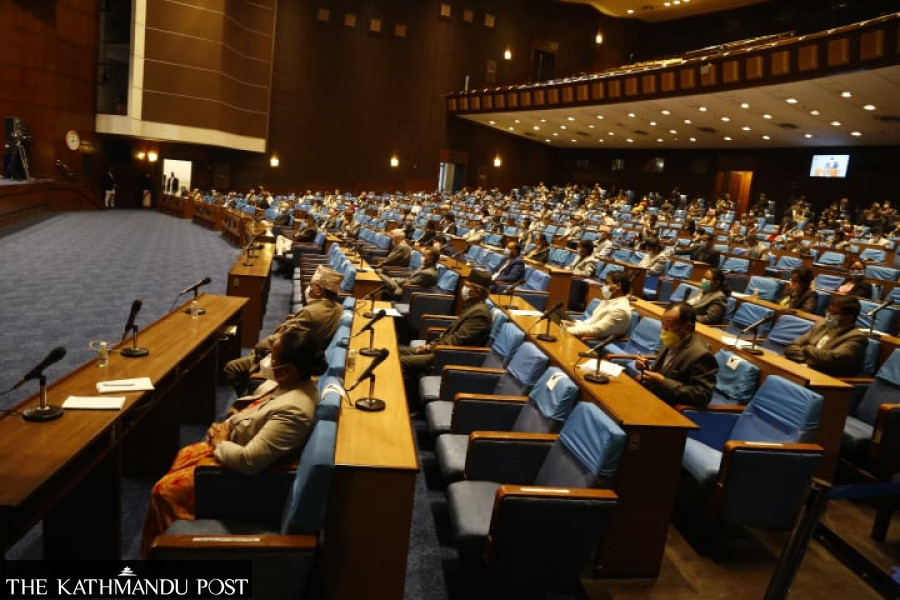National
Budget debate in Nepal is about MPs seeking more for their constituencies
Parliamentarians often forget their main job—making laws. They consider themselves development workers.
Binod Ghimire
While both the Houses of the federal parliament were holding ministry-wise budget discussions on Thursday, Ram Babu Yadav, a Janata Samajbadi Party lawmaker, was busy arguing with Minister for Federal Affairs and General Administration Rajendra Shrestha.
A member of the House of Representatives from Bara Constituency-3, Yadav accused Shrestha, who is a minister from his own party, of being biased against his constituency while allocating the budget. Yadav even misbehaved with Shrestha.
Starting Monday, both houses of the federal parliament are deliberating on the budget that was presented on May 29. Ministers have been responding to lawmakers’ queries.
Yadav, taking part in the deliberations on Tuesday, criticised the budget for being centralised in the constituencies of the top leaders. He, however, didn’t raise the concern he had with Shrestha.
Yadav has alleged that the minister ignored his demands to allocate the budget for some projects in his constituency.
“I didn’t speak about my specific concerns in the House because I don’t believe that will resolve my issue,” he told the Post. “I have given an ultimatum until June 17 to ensure a budget for my constituency. If the minister continues to ignore my demand, I will start a hunger strike from the next day.”
Nepali lawmakers often have a tendency to demand budgets for their constituencies or complain about a lack of a budget in their areas when they participate in the post-budget discussions. Save some, no one gets into policy discussions.
Making and amending the laws, scrutinising the work of the government and making and unmaking of the government are the major tasks of the lawmakers.
The British parliament specifically categorises the responsibilities of parliamentarians as checking and challenging the work of the government, making and changing laws, debating the important issues of the day, and checking and approving government spending.
Nepal follows the Westminster system of parliamentary democracy.
However, lawmakers in Nepal are least focused in debating on lawmaking processes and holding the government to account. Their focus most of the time is on extracting more budget for their constituencies, say experts.
“This wrong tradition has continued for long. Lawmakers are more interested in securing budget than doing their main task of policy discussions and pointing out the government’s wrongdoings,” senior advocate Radheshyam Adhikari, who is a former member of the National Assembly, told the Post. “If you talk about me, I never demanded any budget in my entire tenure of the upper house, be it in the 1990s or recently.”
According to him, there is a perception among the lawmakers and even the voters that they elect their representatives for development works.
“The job of the lawmakers is to quiz the government in the parliament if there are faults in budget preparations. But the lawmakers choose to lobby at the personal level rather than making the ministers accountable,” he said.
In his recent research article published in the journal of International Center for Public Policy under Andrew Young School of Policy Studies in Georgia State University, United States, Khim Lal Devkota, a member of the National Assembly and an expert on fiscal federalism, has claimed that Nepal’s lawmaking process is not consultative as neither the government nor the lawmakers are interested in it.
“Legislative works are not a priority for most of our lawmakers. Their core concern is lobbying for the projects in their constituencies,” he told the Post. “I have seen lawmakers queuing up at ministries to lobby for projects not just with the ministers but also with some low-rung officials.”
According to Devkota, though the issue of Yadav came into the public domain, most of the lawmakers lobby for the budget in different styles.
“Lawmakers should lobby for preparing the framework for the budget allocation rather than knocking the doors of the ministers and the officials,” he said.
After pressure from the cross-party lawmakers, Constituency Development Programme, which was later renamed as Local Infrastructure Development Partnership Programme, was introduced in the federal budget and continued for years. This allows directly elected lawmakers to mobilise millions of rupees in their constituencies.
A lawmaker was allowed to allocate Rs60 million in the respective constituencies until the previous fiscal years.
It was discontinued from the ongoing fiscal year which hasn’t got space in the national budget for the upcoming fiscal year also.
Devkota, however, says the budget preparation and allocation process should also be transparent.
According to him, ministers must explain the basis for allocating more budget for certain areas and less for other areas.
“There is no denying that the budget-making process is not transparent. There has not been equitable distribution of the budget,” he said. “However, to hold the ministers accountable, the issues must be raised in the parliament. This is not something to be decided by a minister and a lawmaker inside a room. This might ensure the budget in the particular constituency for one fiscal year but it is not a solution.”




 8.79°C Kathmandu
8.79°C Kathmandu















